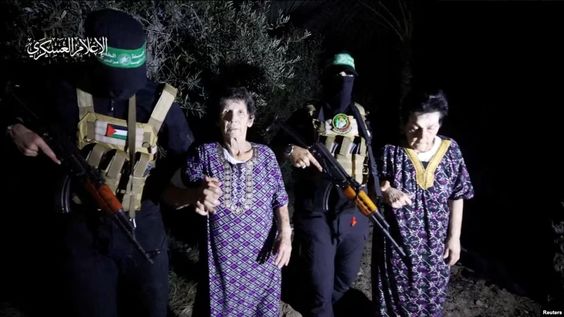Headlines
Israeli airstrikes increase as Hamas releases two more Israeli hostages

As Israel increased its attacks in Gaza and the US voiced growing anxiety about the Israel-Hamas confrontation spreading into a wider Middle East conflict, Hamas freed two more hostages on Monday, two elderly Israeli women.
Hamas said in a statement that it freed the hostages for humanitarian reasons. The 79-year-old Nurit Cooper, also known as Nurit Yitzhak, and 85-year-old Yocheved Lifshitz were taken out of Gaza on Monday night, according to the International Committee of the Red Cross.
On Friday, nearly two weeks after the militant group launched its surprise attack on Israel, killing more than 1,400 people—mostly civilians—and kidnapping more than 200 others, the group freed its first two hostages, an American woman and her daughter.
According to American sources, Washington has advised Israel to postpone its intended ground assault of the Gaza Strip to give time to negotiate the release of the hostages held by Hamas.
Despite American policy, the Israeli military attacked the Gaza Strip on Monday with more than 300 airstrikes.
As hostages are believed to be held in at least portion of the extensive tunnel network that militants have created in Gaza over the years despite Israel’s embargo of the region along the Mediterranean Sea, a ground invasion would certainly complicate any discussions over hostages.
Over 300,000 Israeli soldiers were stationed near the Gaza border last week when Israeli Defence Minister Yoav Gallant promised that his country will soon push into the region but left the timetable of an invasion up in the air.
Additionally, U.S. officials are becoming more concerned that the Israel-Hamas confrontation may lead to a larger conflict in the Middle East.
According to National Security Council spokesperson John Kirby, there have been more drone and rocket strikes on American forces in Iraq and Syria by militias supported by Iran. According to him, the United States was “deeply concerned about the possibility for any significant escalation” of assaults in the coming days.
His remarks echo those of U.S. Secretary of State Antony Blinken and Defence Secretary Lloyd Austin, who expressed alarm about a regional escalation during Sunday television interviews.
At least 18 people were reported dead and numerous others injured in Israeli attacks on Rafah city neighbourhoods on Monday, according to the Hamas-run Interior Ministry in Gaza. According to the Palestinian Health Ministry, at least 5,087 people have died and 15,273 have been injured in Gaza’s more than two weeks of fighting.
On Monday, the Israeli military published videos showing structures in the Gaza Strip being destroyed by airstrikes. Although they could not identify the locations, the military said the recordings indicated attacks on Hamas infrastructure.
Multistory structures fell or crashed over as a series of yellow light bursts were followed by an explosion that sent grey smoke and debris soaring high.
Additionally, Hezbollah locations in Lebanon were hit by Israeli aircraft, including groups the military claimed were getting ready to fire rockets and anti-tank missiles towards Israel.
A critical U.S. military outpost in southeast Syria was attacked, according to Iraqi militias supported by Iran on Monday.
Following a series of such attacks on locations holding U.S. military personnel in Iraq and Syria over the last week, the Islamic Resistance in Iraq, an umbrella organisation of Iranian-backed militias, said that two drones struck the al-Tanf garrison close to the Jordanian and Iraqi borders on Monday.
The European Union’s foreign ministers gathered on Monday to discuss calls for a humanitarian cease-fire in Gaza and methods to increase the amount of essential aid that can reach Gaza.
Truck convoys reached Gaza over the weekend and on Monday, but Josep Borrell, the EU’s top diplomat, said that “in normal circumstances, free from war, 100 trucks enter Gaza every day.” It is obvious that 20 [per day] is insufficient.
READ ALSO: Islamic group stages pro-Palestine demonstration in Lagos amid Hamas-Israeli conflict
Restarting the desalination plants that supply electricity and water, according to Borrell, must be prioritised. He told reporters in Luxembourg, the location of the EU meeting, “Without water and electricity, the hospitals can hardly function.”
According to him, the ministers would also consider long-term solutions to the Israeli-Palestinian problem.
The major nations believed that the Palestinian problem would be resolved on its own or that it didn’t important, therefore they ignored it. It does matter, according to Borrell.
According to the UN, there is a severe lack of water, food, fuel, and medication in the area, and that 1.4 million people have evacuated their homes in Gaza.
Borrell added that efforts to deescalate the situation must also result in the release of hostages held by the militant group Hamas and a cessation of rocket assaults from Gaza.
Israeli leaders have vowed to keep up the Gaza offensive until Hamas is unable to launch attacks.
This piece was written by UN journalist Margaret Besheer. Reuters, Agence France-Presse, and The Associated Press all contributed information to this article.
